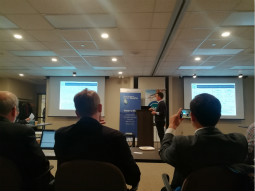From December 3 to 7, 2018, at the
invitation of the University of Saskatchewan, Canada, the College of Water
Sciences' Secretary Teng Yanguo, Associate Dean Pan Chengzhong, Professor Hu
Litang, Professor Liu Haijun and Foreign Affairs Secretary Dong Haoyue visited
the University of Saskatchewan, Canada, as a delegation of 5 to participate in
the first meeting of Sino-Canadian Joint Research Center on Climate and Water
Sciences and to discuss issues on joint research and education.
Under the arrangement of the University,
the delegation visited laboratories and large-scale testing equipment. They had
academic conversations and discussions with professors from the University's
Global Institute for Water Security and relevant institutions, fruitfully
reaching consensus on the Sino-Canadian program of Master of Water Security and
joint research. At the noon of December 7, Professor Peter Stoicheff, President
of University of Saskatchewan, warmly received the delegation and expressed his
expectations that University of Saskatchewan and Beijing Normal University will
exert respective advantages and cooperate in water science research to build an
internationally renowned research center for climate and water sciences and
contribute their wisdom and strengths to safeguarding global water security.

(Professor Peter Stoicheff, President of
University of Saskatchewan, meets with Secretary Teng Yanguo)
On the afternoon of December 4 and 7, the
delegation successively visited the International Student and Study Abroad
Centre (ISSAC) of University of Saskatchewan, Canadian Light Source, Smart
Water Systems Laboratory, Mine Overlay Site Testing (MOST) Facility and
Toxicology Centre of University of Saskatchewan. While accompanying the
delegation, representatives of University of Saskatchewan introduced the
university's research equipment and strengths in related disciplines and the
current situation of international student programs, laying a good foundation
for future student exchange and scientific cooperation between the two
universities.




Upper left: the delegation visits Canadian
Light Source; upper right: the delegation visits Smart Water Systems Laboratory
Lower left: the delegation visits MOST
Facility; lower right: the delegation visits Toxicology Centre of University of
Saskatchewan
From December 5 to 6, the delegation
participated in the seminar of Sino-Canadian Joint Research Center on Climate
and Water Sciences and the round table conference on climate and water
sciences. The seminar was presided over by Lawrence Martz, Vice-Dean of Faculty
Relations and Professor of the University of Saskatchewan. Famed professors
from the Global Institute for Water Security of the University of Saskatchewan
including Dr. Jay Famiglietti, Dr. Jeffrey Mcdonnell, Dr. Irena Creed and Dr.
Martyn Clark, and members of the delegation respectively delivered academic
reports and introduced their research interests. The round table was chaired by
Dr. John Pomery, Associate Director of the Global Institute for Water Security,
and was attended by interdisciplinary experts from the Department of Geography
and Planning, School of Environment and Sustainability, and Department of Civil
and Geological Engineering. Thanks to the seminar, the two sides gained a
better understanding of each other and found common ground in research
interests and a broad prospect of interdisciplinary cooperation, laying a solid
foundation for them to cooperate in scientific research in the future.






Upper left: Secretary Teng Yanguo makes a
speech; upper right: Jay Famiglietti, Executive Director of the Global
Institute for Water Security of University of Saskatchewan, speaks at the
meeting
Middle left: teacher Hu Litang makes a
speech; middle right: teacher Liu Haijun speaks at the meeting
Lower left: Mr. Pan Chengzhong introduces
the research fields of the College of Water Sciences at the round table
conference; lower right: the round table conference on climate and water
sciences